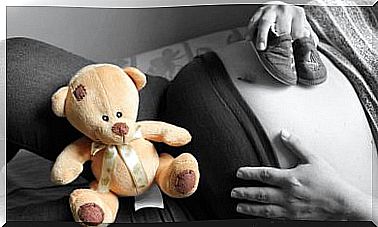7 Common Baby Behaviors During The First Months

Welcoming the newborn home after the birth is one of the most special and beautiful moments for every parent, but since then? What can you really expect for baby behaviors during the first months?
After birth, babies experience a period of continuous growth and development. It is a period of many discoveries, both for the parents and for the newborn.
The first months are when the baby undergoes physical, social, emotional and intellectual development, and while it is happening, you can see baby behaviors that can give rise to anxiety and questions.
1. Deep sleep
During the first days after birth, the baby goes through periods of deep sleep, both in the morning and at night. During the first few days , babies can actually sleep for up to 20 hours a day. They only wake up when they are hungry and need to eat.
Sleeping is incredibly important for babies’ health. This allows them to develop the rest of their abilities as they should.
2. Smiles when they sleep
When they sleep , babies can show an unconscious smile. Remember that the little ones are not aware of it!

Screams or vocalizations (0-3 months)
During the first weeks , the baby can express anger, frustration, hunger, pain and pleasure through screams and tears. Trying to understand what the baby’s scream means is not easy, but it is never done for no reason.
They also begin to respond to the sound of your voice with vocalizations and gurgling.
4. Cry
Common baby behaviors of course include regular crying. Crying is their way of communicating. Their tears can be translated into hunger or discomfort. But as I said, it is not always easy to interpret.
Many parents feel helpless when confronted with their baby’s crying, but it is important not to panic. Comfort the baby by taking it in his arms and do not systematically associate crying with suffering.
5. They put things in their mouths
The baby will try to explore the world by putting things in his mouth. They have an appetite to explore which can sometimes be dangerous.
Therefore, keep the baby away from all small objects that can be accidentally swallowed.

6. Irritability
Sometimes babies can show their discomfort or fatigue through anger or irritability. There is no need to worry if they get outbreaks from time to time.
At the same time, irritability can be a sign of physical discomfort that needs to be treated. If you notice sudden changes in behavior, do not hesitate to talk to a pediatrician.
7. Use of body language (4-7 months)
When a baby reaches four months, it begins to show better control over its body. Vision improves and the baby shows great interest in toys. Toys can be a goldmine for motor and intellectual stimulation.
By the sixth month of life, the hands and feet are a little more mobile, and the baby begins to use signs to communicate.
It may even try to sit or turn on its own. It indicates the development of strength, balance and coordination.
In the first months after birth, touch and gaze are their main means of communication (in addition to crying, of course).









